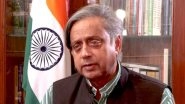Hyderabad, Dec 28 (PTI) Amid a raging debate on thegovernment's resolve to ensure that only electric vehicles aresold in the country from 2030, a key official of Toyota'sjoint venture has pitched for a technology-agnostic approachgiving options for consumers and leeway to auto producers.Shekar Viswanathan, vice-chairman and wholetimedirector at Toyota Kirloksar Motor, said consumers should begiven freedom to make a logical choice, and manufacturersenough leeway so that they can produce what the consumerwants.Viswanathan said the government's ambitious target ofall-electric fleet from 2030 is "not practical, and it's notthe way forward".He also argued that EVs alone are not the best answerto curb vehicular pollution.Customers who have a certain distance to travel everyday will choose electric, and those who don't have a fixedschedule, may choose hybrid, according to him."In time to come, others may choose hydrogen becausethere is zero pollution in hydrogen vehicles. So, I think thegovernment has to recognise this, be technology-agnostic, andencourage all techologies and fix the tax rates accordingly,"he said in an interview to PTI."All technolgies must be encouraged because no bodyknows which technology is going to succeed," Viswanathan said.Technologies which generate more pollution have to bediscouraged through suitable fiscal dis-incentives, whilethose which minimise the amount of pollution should beencouraged by way of fiscal incentives."I don't think electric vehicles is the immediateanswer. Yes, there will be a certain percentage of vehiclepopulation which will have electric, but we still have to relyon internal combustion engine, hydrogen vehicles and hybridvehicles for the remainder," Viswanathan said.Asked if India should avoid rushing into an era ofEVs, he said, "If that's what the consumer wants, the rushwill happen on commercial terms but if you (Government)mandate that I will give huge tax incentive for electric but Iwill penalise hybrid which is very friendly in terms ofpollution levels, then it's not a level playing field."So, the Government needs to recalibrate the tax onhybrids, particularly on strong hybrids which function likeelectric vehicles, he suggested."Important point is not whether we will be drivinghydrogen vehicles, or continue with internal combustion engineor move to pure electric or hybrid. The point is, are yougiving enough freedom for consumers to make a logical choice,and therefore, are you giving the producers of such vehiclesenough leeway so that they can produce what the consumerwants.""You have to give a bouquet of options to carcustomers and customer will choose. Now, if you penaliseobviously polluting vehicles, which run on BS-III and BS-IV,BS-II and BS-I...they need to be removed from the roads first,and I wish the Government takes action on that," he said."Today you have this lopsided tax structure whereelectric vehicles attract 12 per cent tax, and hybrids aretreated like 'sin goods'," he pointed out.According to him, major car players in the world haveall the technologies, electric, hybrid, internal combustionengine, that too BS-VI and they will progress towards BS-VIIgiving very clean fuel."But to commercialise and make it a practicalproposition for the consumer, we have to stitch itby market-to-market," he said.In some parts of India, EVs may well succeed becauseof enough charging infrastructure, adequate power, and a gridthat is able to withstand surges in power drawing, amongothers."But is it possible across India? I don't think so.Because in certain pockets of India you don't have power, letalone quality power. I think it's better to take a cautious,practical approach than making grand statements that we willbe 100 per cent electric (from 2030)," Viswanathan said."You can't say EVs are not polluting at all if you are going to generate power from coal-fired power stations. There will be pollution then. You have to measure all this on 'well to wheel basis' and you have to measure total pollution for each form of transport and then fix the taxes accordingly. So, more polluting ones should be penalised more and less polluting ones should be penalised less," he said.
(The above story is verified and authored by Press Trust of India (PTI) staff. PTI, India’s premier news agency, employs more than 400 journalists and 500 stringers to cover almost every district and small town in India.. The views appearing in the above post do not reflect the opinions of LatestLY)













 Quickly
Quickly












